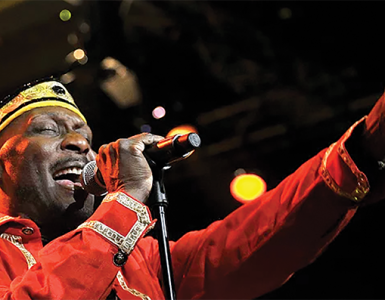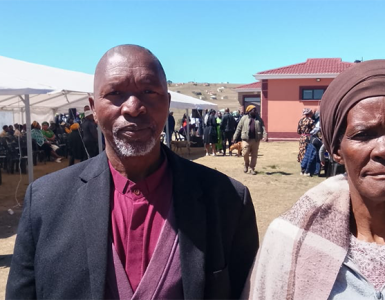STRONG-WILLED:Multiple detention spells would not deter him from pushing for free South Africa from oppressive regime
Aubrey Dundubala Mokoena was born in Orlando West, Johannesburg in 1948 to Steven and Rossetta Mokoena, but due to his mother’s bad health, he was brought up by a family friend, Mrs Anna Khomo. Even though his parents were unhappy to move to Johannesburg, they were forced to do so to look for work. They would almost every year undertake trips to the Free State to visit the graves of his relatives.
Although it was quite easy for the Mokoenas to find work, like most black families, they found it more difficult to find a family home in Johannesburg until James Mpanza, a community leader who had taken over a piece of land in Orlando where he provided land for the homeless.
The government eventually extended Orlando West into the area, and it became Soweto. He was also a strong Christian and a member of the African Methodist Episcopal Church, where his wife joined the Mother’s Union. Aubrey Mokoena was introduced to politics by his father at the age of twelve who got involved with the African National Congress (ANC), although it was critical of Mpanza. He learnt about the potato boycott from his father, and from then on, potatoes were not eaten in either the Mokoena or Khomo households. It was also in this year that the ANC and Pan Africanist Congress (PAC) were banned.
In the Khomo house he was taught the value of education, and he developed a very close bond with his adoptive mother. He remembers how one day they were suddenly no longer provided with meals at school and how slogans about Bantu Education were painted on walls.
One day members of the ANC came to visit the school and said that a boycott should be started. Mokoena was very unhappy about this, as was Anna Khomo, but his father, who was a branch organiser in the ANC, told him they must do something to get equal education.
While Steven Mokoena made his son politically aware, Anna Khomo continued to insist that he continue his education. He completed school at Orlando West High, with his contemporary, Lindelwa Mabandla under Principal Mbathane, where he became Head Prefect in his last year.
When he completed school in 1969 he wanted to go to university, but could not afford the fees. He was able to get a teaching job at his old school, Orlando North in Mzimhlophe where he taught with Ohara Diseko.
In 1970, through a bursary awarded by the African Teachers’ Association, he was able to enrol at the University of the North, popularly known as Turfloop. At university he founded the university choir and was chairman of the Students Christian Movement. In 1972, he was elected Vice- President of the SRC, alongside Onkgopotse Abraham Tiro who became President.
He was later elected chairman of the local South African Student’s Association (SASO) and was thus part of the SASO executive that became very involved in resistance politics and particularly the Black Consciousness ideas of Black power.
That same year, as President of the SRC, Tiro gave the graduation speech which led to his expulsion from the university. The students began to protest and the university reacted by expelling the entire student body.
After a month, the university invited students to re-register but refused to register the SRC members, and instead expelled them and nine other activists. This led to student strikes and protests at other universities across the country, and more students were expelled from Fort Hare and Durban-Westville. This action led to a reawakening of political activity, and the formation of the Black People’s Convention (BPC) and Black Communities’ Programme of which Mokoena became a member.
At the insistence of Anna Khomo, Mokoena enrolled at UNISA to continue his degree, and got a job heading the Transvaal section of the Black Community Programme. From here he was able to help his community and develop and spread his political ideas. Although the government became concerned about the project, it did not attack the organisation directly.
It did however use other means of attack until 1974, when SASO organised Frelimo rallies with the independence of Mozambique. The government banned SASO rallies. Despite not going on with the rally in Johannesburg, unlike in Durban, Mokoena and others were detained.
Mokoena was tortured in detention while the police tried to find about the links that they presumed existed between Frelimo and BPC. He was released nine months later without being charged. He began his clinic again and later got married to Maleshane (Mally) Mokoena.
However, the clinic did not last long as the government began to clamp down on all programmes suspected to be linked to the Black Consciousness Movement.
When the 1976 the Soweto school uprising began, and the apartheid government blamed the Black Consciousness Movement, Mokoena was arrested again whilst SASO, BPC and other Black Consciousness organisations were banned.
From prison Mokoena wrote to Lybon Mabaso that ‘Your silence is deafening’, which Mabaso interpreted as a call for the organisations to resist banning by reorganising. AZAPO was founded in 1978, and Mabaso was arrested. A year later, they were all released, with Mokoena slapped with a five-year banning order.
Over the next few years Mokoena’s political activities were restricted due to his banning order, which expired in 1983. At the end of his banning order, he felt AZAPO had taken an anti-ANC viewpoint and decided the ANC was his political home.
He decided to join and get involved with the United Democratic Front (UDF) in 1984.
Within the UDF, he became involved in the Release Mandela Campaign (RMC) and joined the anti-tricameral parliament campaign. He was again arrested, charged with treason in the Pietermaritzburg
Treason Trial. He was acquitted. He continued this work until he was arrested again in 1986 following the State of Emergency that was declared in 1985. On release he was once again banned.
Mokoena continued the fight for the release of political leaders through the Release Mandela Campaign which became his main political platform, working alongside Mama Winnie Mandela, MamGreta Ncapayi, Ntate Matthews and other leaders.
He was a leading force in assisting with the integration of the first group of political leaders that were released in 1989, including Walter Sisulu, Govan Mbeki, Wilton Mkwayi, Elias Motsoaledi and others.
After the unbanning of liberation movements, the release of Nelson Mandela in 1990 and the elections of 1994, Mokoena was appointed Member of the first Parliament where he served as chairperson of the Committees for Environmental Affairs and Tourism and Public Enterprises.- Mokoena family.


































